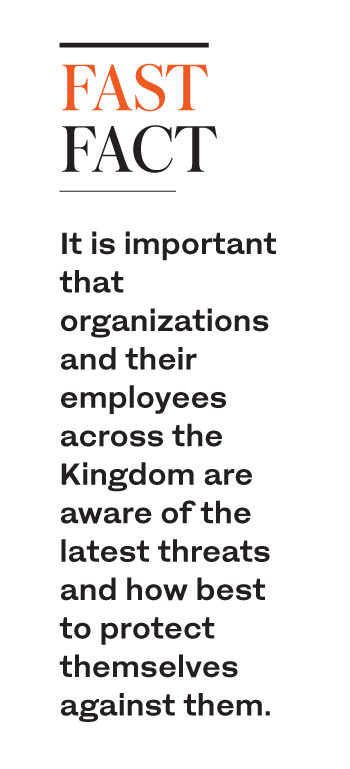DUBAI: Digital transformation will generate an extra $16.9 billion in revenue each year for the Middle East between now and 2021, according to Microsoft.
Because of this, Saudi Arabia has become an enticing target for cybercriminals because of insecure consumer habits and inadequate security measures, the company’s cybersecurity study has revealed. The study highlights top three kinds of cyberthreats the Kingdom faces.
Botnets, ransomware: A botnet is a combination of the words “robot” and “network.” Botnets can be infected with malware that allows hackers to take control of several devices at a time. Cybercriminals use botnets to spread malware, conduct online attacks, send spam, conduct denial-of-service attacks on websites, and facilitate click fraud. The GCC has nearly 11.4 percent of the Middle East’s total bot population. Riyadh has the highest rate of botinfections with 43.1 percent of bots.
Low-hanging fruit: Hackers take advantage of a “low-hanging fruit” to get around increasingly sophisticated security measures. By doing so they are able to commit “social engineering”: The use of deception to manipulate individuals into divulging confidential or personal information that may be used for fraudulent purposes. This can occur owing to poorly secured cloud applications and can help take advantage of legitimate platform features to infect computers.
Ransomware: This is a type of malicious software that blocks access to a computer until a sum of money is paid as a form of cyberextortion. Ransomware continues to be a popular method used by cybercriminals. An example is the Wannacrypt Virus, which affected more than 230,000 computers last year.
The Ministry of Finance data revealed in Saudi Arabia’s first-ever pre-budget statement a total government expenditure that is expected to hit SR1,106 billion ($294.89 billion) next year. It is a move to further the implementation of the Kingdom’s Vision 2030 programs, initiatives and projects, which are at the heart of its mission to diversify its economy.
 Many ministries, institutions and government entities have undergone restructuring to enable their mandates more effectively and increase their competencies. It’s important that organizations and their employees across Saudi Arabia are aware of the latest threats and how best to protect themselves against them. Part of the Kingdom’s plans include the expansion of digital services to reduce delays and optimize performance.
Many ministries, institutions and government entities have undergone restructuring to enable their mandates more effectively and increase their competencies. It’s important that organizations and their employees across Saudi Arabia are aware of the latest threats and how best to protect themselves against them. Part of the Kingdom’s plans include the expansion of digital services to reduce delays and optimize performance.
According to Microsoft research data, the acceleration of digitalization and insecure consumer habits, as well as inadequate cybersecurity measures in key sectors, has made Saudi a cybertarget in the past.
An example of this was in 2012 when cyberattacks were frequent. They included “Shamoon,” an aggressive disc-wiping malware used in attacks against the Saudi energy sector. Saudi Aramco was among the firms hit by Shamoon, in what is believed to be the country’s worst cyberattack yet, the research revealed.
Saudi Arabia has hosted several cybersecurity forums, inviting hundreds of leading regional and international information security and cyber-defense experts.
They have deliberated on issues that continue to challenge the business leaders and forces them to rethink their defense strategy to counter the threat of cyberattacks.
These forums are landmark annual events in Saudi Arabia that witnesses key government agencies and major stakeholders collaborate on many issues, including the adoption of recognized information security frameworks.
Microsoft report reveals top 3 cyberthreats in Saudi Arabia
Microsoft report reveals top 3 cyberthreats in Saudi Arabia

Physical activity in Ramadan can boost public health, expert says

- Sports must be managed, argues Jazan University specialist
- Hour before iftar ideal for light muscle-stimulation exercises
RIYADH: Promoting physical activity during Ramadan can boost public health, according to a local expert.
Dr. Ibrahim Bakri, a specialist in sports management at Jazan University, said that exercise during Ramadan should not be stopped but managed, the Saudi Press Agency reported recently.
Practicing low-intensity activities before iftar was a suitable option, such as slow walking, stretching, or light exercises that activate muscles, because of their role in stimulating blood circulation without depleting fluid and energy stores.
He said that the hour before the Maghrib prayer was an ideal time for such light activities and reduces the likelihood of stress or low blood sugar levels.
Bakri also pointed out the importance of avoiding strenuous exercise during fasting hours.
He said that high-intensity sports should be postponed until at least three hours after iftar, to give the body the opportunity to digest food and restore its water and nutritional balance.
Resistance exercises, running and team games need to be undertaken carefully to avoid fatigue or muscle spasms, he added.
He stressed that exercise during Ramadan contributes to weight control, improves cardiovascular fitness, and regulates blood sugar levels.
Physical activity also plays a role in reducing stress and improving sleep quality, which reflects positively on the performance of a fasting person in work and daily life.
He emphasized the importance of drinking sufficient water between iftar and sahoor, and having meals in moderation. Also people should make sure to warm up and cool down when undertaking exercise to reduce the possibility of injury.
Bakri said walking was the simplest and most sustainable form of physical activity because it has a direct impact on promoting heart health and improving mood.











